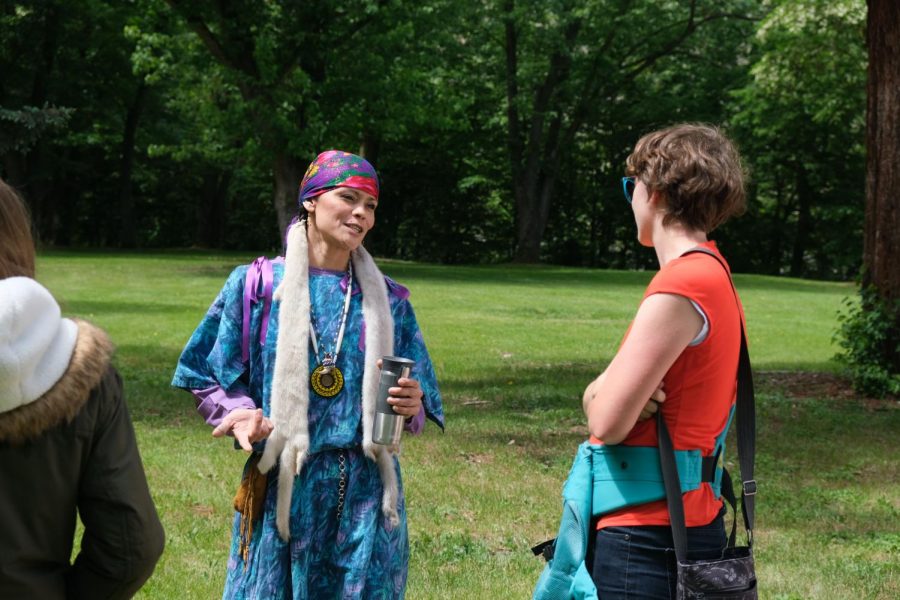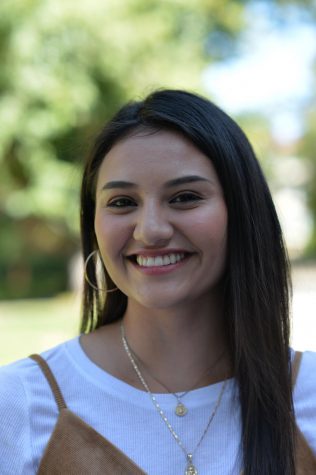Restoring Nez Perce language for future generations
Younger generations learn their native language
JACOB BERTRAM | THE DAILY EVERGREEN
Mary Jane Oatman, storyteller for the May 18 Culture Day event at the Nez Perce Historical Park, is a registered member of the Nez Perce Tribe.
July 3, 2019
The Nez Perce Tribe and Lapwai School District in Idaho have made several efforts in restoring the tribe’s language through programs to regain what has been lost and give the language to the younger generations.
Mary Walker, an English teacher at Lapwai High School who has been teaching for about three generations, said she helps facilitate the language program at the school, which is offered as an elective. About 35 students were enrolled in one class this past school year, while another class had about 50 students.
Walker said she and her son learned the basics of the language for about two years, which was taught by a venerated elder of the Nez Perce tribe about 22 years ago.
“When we returned [to Lapwai], I expressed to our principal at the time that I really wanted to see it grow,” she said.
Several members of the tribe who spoke the language went into classrooms to teach high school students, Walker said. The tribe and the elders’ committee gave their blessing, which helped gather the necessary resources to teach a language that was normally spoken instead of written.
“For the kids who are interested, for the kids who come from homes that support it, it gives them a lot of pride that they’re able to even learn as much as they learn,” she said.
Farley Eaglespeaker, a student at Lapwai High School and a member of the Nez Perce tribe, said it was cool to see students have the opportunity to learn the language.
“We have it more available to us than the generations before us,” he said.
Mary Jane Oatman, a member of the Nez Perce tribe, said that although she received a minor in the Nez Perce language, she still feels like she lacks a few skills to be conversational.
“It honestly feels like we are in a race against time with the generation that we’re in now to even have the desire to want to learn the language with all of the competing interests,” Oatman said. “The tools are there. The resources are there.”
She said she decided to attend college when her son was about four months old to show him that he had the opportunity for an education rather than grow up poor on the reservation like she did.
“It was at a predominantly white institution where I was able to learn my Nez Perce language, where I was given the biggest task that I was ever given and that was to do a family tree project,” she said.
Oatman, who is 40 years old, said many pathways to the landscape and traditions were lost for future generations and have been supplemented with social media and entertainment.
“We lost so much with the language loss,” she said. “In English, they’ll never find the words to be able to explain why they love the land they’re standing on, and in English, they’re never going to be able to explain the level of hurt that they still feel.”
Walker said, three generations ago, many Native Americans were sent to boarding schools and were beaten if they spoke their language.
“They were hesitant to teach their kids because they didn’t want their kids to get in trouble, and schools didn’t teach it,” Walker said. “You know there was this terrible distrust for such a long time of the school system and rightly so.”
Many Americans don’t understand what forces affect Native Americans, Walker said. They generally are not aware of the historical and generational trauma because they have never been taught or sought out the history.
She said her husband accompanied her class on a trip to the Big Hole National Battlefield and Bear Paw Battlefield.
“He didn’t know what really happened …we talked about where the river was running red with blood,” Walker said. “He didn’t know that, and that night we had a talking circle, and he cried.”
Several schools in the Lapwai School District have Nez Perce elders go in to teach language classes, but Lapwai High School is the only school that offers everyday classes.
The elder who taught the language at the high school passed away last November. It was hard for the students, Walker said, because he was just this force that kept everybody on track.
“It’s hard to teach a language that isn’t spoken. Like you don’t have anybody really to go home and speak to,” she said. “We’re down to very few Nez Perce native speakers, and that’s sad.”
Walker said she hopes the high school will continue to offer the language program and that members of the tribe continue to be willing to go into classrooms to teach students.
“I just think [the language program] far outweighs anything because this is their heritage and we talk about … promoting culture and heritage, and I don’t think you can do that unless you also promote the language,” Walker said.
Kinship systems are also a part of the language, Oatman said. Rebuilding those severed ties will restore old traditions and laws.
“Through our language, that sense of pride in being Niimiipuu is going to be here for another 15,000 years,” she said.











